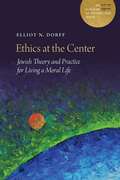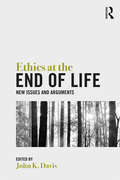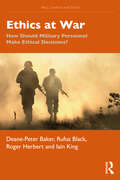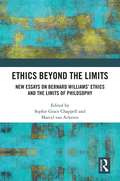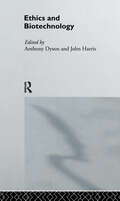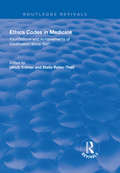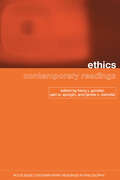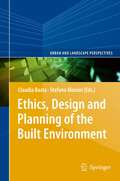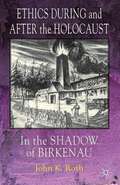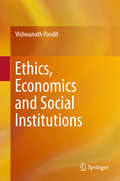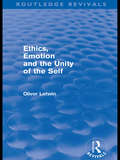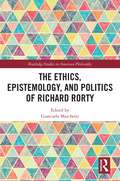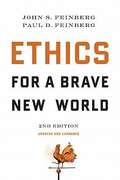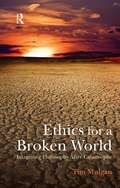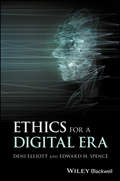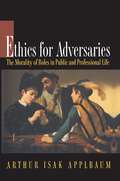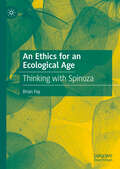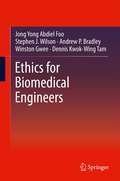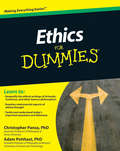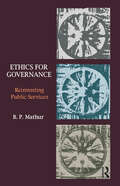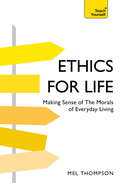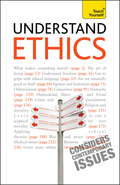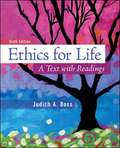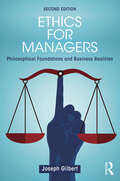- Table View
- List View
Ethics at the Center: Jewish Theory and Practice for Living a Moral Life (A JPS Scholar of Distinction Book)
by Rabbi Elliot N. DorffEthics at the Center culls the best of Rabbi Elliot N. Dorff&’s pioneering thinking in Jewish ethics over nearly five decades. Dorff shows that our response to moral issues depends ultimately on our conceptions of the nature of human beings and God; how Jewish law, theology, prayer, history, and community should also define and motivate Jewish responses to moral issues; and how the honorable and divergent stances of Western philosophy and other religions about moral living shed light on Judaism&’s distinctive standpoints. From there Dorff applies Judaism&’s ethics to real life: abortion post–Roe v. Wade, sexual orientation and human dignity, avoiding harm in communication, playing violent or defamatory video games, modern war ethics, handling donations of ill-gotten gain after the fact. In conclusion he explores how Jewish family and community, holidays and rituals, theology, study, and law have moral import as well. Dorff&’s personal introduction to each chapter reflects on why and when he wrote its contents, its continuing relevance, and if—and if so, how—he would now change what he wrote earlier. Readers will experience not only his evolving ethical thought but many facets of the person and the Jew that Dorff is today.
Ethics at the End of Life: New Issues and Arguments
by John DavisThe 14 chapters in Ethics at the End of Life: New Issues and Arguments, all published here for the first time, focus on recent thinking in this important area, helping initiate issues and lines of argument that have not been explored previously. At the same time, a reader can use this volume to become oriented to the established questions and positions in end of life ethics, both because new questions are set in their context, and because most of the chapters—written by a team of experts—survey the field as well as add to it. Each chapter includes initial summaries, final conclusions, and a Related Topics section.
Ethics at War: How Should Military Personnel Make Ethical Decisions? (War, Conflict and Ethics)
by Deane-Peter Baker Rufus Edward Black Roger Gordon Herbert Iain Benjamin KingThis book debates competing approaches to ethical decision-making for members of the armed forces of liberal democratic states. In this volume, four prominent thinkers propose and debate competing approaches to ethical decision-making for military personnel. Deane-Peter Baker presents and expounds the ‘Ethical Triangulation’ model, an ethical decision-making method he has employed through much of his career as an applied military ethicist. Rufus Black advocates for a natural law-based approach, one which has heavily influenced the framework formally adopted by the Australian Defence Force. Roger Herbert outlines the ‘Moral Deliberation Roadmap’, the moral reasoning framework recently adopted by the US Naval Academy. Iain King then sets out a model of quasi-utilitarian decision-making developed in several post-conflict settings and refined at the UK’s Royal College of Defence Studies. After the opening chapters in which each author outlines their favoured decision-making approach, the four contributors then evaluate each other’s proposals, often critically. Philosopher David Whetham offers some concluding thoughts in which he summarizes areas of agreement between the authors, identifies key areas of difference, and suggests directions for future research. This book will be of great interest to students of military ethics, the ethics of war, moral philosophy, and International Relations, as well as military professionals.
Ethics Beyond the Limits: New Essays on Bernard Williams’ Ethics and the Limits of Philosophy
by Sophie Grace Chappell Marcel Van AckerenBernard Williams’ Ethics and the Limits of Philosophy is widely regarded as one of the most important works of moral philosophy in the last fifty years. Williams’s powerful sceptical critique of the "morality system" sent shockwaves through philosophy, the implications of which are still being reckoned with thirty years later. In this outstanding collection of new essays, fourteen internationally-recognised philosophers examine the enduring contribution that Williams’s book continues to make to ethics. After a detailed topical summary of Ethics and the Limits of Philosophy by Adrian Moore, the full scope of the work is assessed, including the role of Aristotle and Hume in Williams’ thought and his arguments concerning the history of philosophy; the nature of virtue, the good life, practical reason, and deliberation; and the themes of duty, blame and inauthenticity. Ethics Beyond the Limits is required reading for students and researchers in ethics, metaethics, and moral psychology, and highly recommended for anyone studying the work of Bernard Williams.
Ethics & Biotechnology: The Ethics Of Human Biotechnology (Social Ethics And Policy Ser.)
by John Harris Anthony DysonThe development of biotechnology has produced nothing short of a revolution, both in our capacity to manipulate living things from single plant cells to human nature itself, but also to manufacture brand new life forms. This power to shape and create forms of life has sometimes been described as the power to "play God" and this book is about the ethics of "playing God" in the field of biotechnology. International scholars cover moral dilemmas posed by biotechnology, from the smallest cells through animals to the engineering of human beings.
Ethics: Bullet Guides
by Robert AndersonOpen this book and you will Understand morals Discover freedom Meet key figures Apply ethics
Ethics Codes in Medicine: Foundations and Achievements of Codification Since 1947 (Routledge Revivals)
by Ulrich Tröhler Stella Reiter-Theil Eckhard HerychFirst published in 1998, this volume considers the Nuremberg Code in light of new ethical grey areas which have become evident due to recent scientific advancements, particularly the questions of DNA and cloning. The contributors reflect in 26 articles on the impact of the Code, events which prompted it including Japan, and more recent ethical issues raised. The book contains the results of two European/American preparatory workshops for the First World Conference on Ethics Codes in Medicine and Biotechnology (October 1997 Freiburg, Germany) supported by the leading national institutions in the field. It aims to stimulate research about codes, the effects of codification and other forms of implementing ethics. It breaks new ground with interdisciplinary and international discourse on the subject, emphasising the need for a complete collection of codes for systematic research and evaluation and filling the gap in literature on the subject to date.
Ethics: Contemporary Readings (Routledge Contemporary Readings in Philosophy)
by Harry J. Gensler Earl W. Spurgin James C. SwindalEthics: Contemporary Readings is designed to lead any student into the subject, through carefully selected classic and contemporary articles. The book includes articles by the leading figures in the field and provides an excellent entry to the topic. The book complements Harry Gensler's Ethics: A Contemporary Introduction (Routledge, 1998).
Ethics, Design and Planning of the Built Environment
by Claudia Basta Stefano MoroniThe book proposes a set of original contributions in research areas shared by planning theory, architectural research, design and ethical inquiry. The contributors gathered in 2010 at the Ethics of the Built Environment seminar organized by the editors at Delft University of Technology. Both prominent and emerging scholars presented their researches in the areas of aesthetics, technological risks, planning theory and architecture. The scope of the seminar was highlighting shared lines of ethical inquiry among the themes discussed, in order to identify perspectives of innovative interdisciplinary research. After the seminar all seminar participants have elaborated their proposed contributions. Some of the most prominent international authors in the field were subsequently invited to join in with this inquiry. Claudia Basta teaches "Network Infrastructures and Mobility" at Wageningen University. Between 2009 and 2011 she worked as Coordinator of the 3TU Centre of Excellence for Ethics and Technology of Delft University, where she completed her post-doc research on the shared areas of investigation between risk theories, planning theories and ethical inquiry. Her main research interests concern the matter of assessing and governing technological risks in relation to sustainable land use planning. She wrote a number of journal articles and contributions to collective books on these themes. Stefano Moroni teaches "Land use ethics and the law" at Milan Politecnico. His main research interests concern planning theory and ethics. He is the author of a number of books and journal articles. Recent publications (as co-author): Contractual Communities in the Self-Organizing City (Springer 2012).
Ethics During and After the Holocaust: In the Shadow of Birkenau
by John K. RothAbsent the overriding or moral sensibilities, if not the collapse or collaboration of ethical traditions, the Holocaust could not have happened. Its devastation may have deepened conviction that there is a crucial difference between right and wrong; its destruction may have renewed awareness about the importance of ethical standards and conduct. But Birkenau, the main killing center at Auschwitz, also continues to cast a disturbing shadow over basic beliefs concerning right and wrong, human rights, and the hope that human beings will learn from the past. This book explores those realities and the issues they contain. It does so not to discourage but to encourage, not to deepen darkness and despair but to face those realities honestly and in a way that can make post-Holocaust ethics more credible and realistic. The book's thesis is that nothing human, natural or divine guarantees respect for the ethical values and commitments that are most needed in contemporary human existence, but nothing is more important than our commitment to defend them, for they remain as fundamental as they are fragile, as precious as they are endangered.
Ethics, Economics and Social Institutions
by Vishwanath PanditThe book highlights the ethical aspects and issues that are inherent to economics in the context of today's prominent social institutions. It reviews a range of problems concerning dominant social institutions, namely markets, government agencies, corporate entities, financial networks, and religious systems. Further, in each case, the book takes a detailed look at the economic problems as they arise within a broader sociological and political environment, taking into account the respective ethical/philosophical paradigms. It analyzes from an ethical point of view topics like the evolution of economic thought, happiness and spirituality, and human values in relation to ethics.
Ethics, Emotion and the Unity of the Self (Routledge Revivals)
by Oliver LetwinThis Routledge Revival reissues Oliver Letwin’s philosophical treatise: Ethics, Emotion and the Unity of the Self, first published in 1987, which concerns the applicability of the artistic classifications of romanticism and classicism to philosophical doctrine. Dr Letwin examines three particular theses associated with philosophical romanticism: that there is within us a high self and a low self; that there is a moral self in inevitable conflict with an amoral self; and that there is a rational self disjoined from and in tension with a passionate self. He argues that these notions of philosophical romanticism are, in fact, radically false, and instead takes the view that man can be a unified being of the sort described by philosophical classicists. But man has to work to achieve this status. The intrinsic unity of the human personality is not a guarantee of a coherent life, but a challenge to be met.
The Ethics, Epistemology, and Politics of Richard Rorty (Routledge Studies in American Philosophy)
by Giancarlo MarchettiThis book features fourteen original essays that critically engage the philosophy of Richard Rorty, with an emphasis on his ethics, epistemology, and politics. Inspired by James’ and Dewey’s pragmatism, Rorty urged us to rethink the role of science and truth with a liberal-democratic vision of politics. In doing so, he criticized philosophy as a sheer scholastic endeavor and put it back in touch with our most pressing cultural and human needs. The essays in this volume employ the conceptual tools and argumentative techniques of analytic philosophy and pragmatism and demonstrate the relevance of Rorty’s thought to the most urgent questions of our time. They touch on a number of topics, including but not limited to structural injustice, rule-following, Black feminist philosophy, legal pragmatism, moral progress, relativism, and skepticism. This book will be of interest to a wide range of scholars across disciplines who are engaging with the work of Richard Rorty.
Ethics for a Brave New World (2nd Edition)
by John S. Feinberg Paul D. FeinbergThis updated and revised second edition analyzes the current literature regarding various ethical issues. It includes a new chapter on stem cell research and expanded material on other topics.
Ethics for a Broken World: Imagining Philosophy After Catastrophe
by Tim MulganImagine living in the future in a world already damaged by humankind, a world where resources are insufficient to meet everyone's basic needs and where a chaotic climate makes life precarious. Then imagine looking back into the past, back to our own time and assessing the ethics of the early twenty-first century. "Ethics for a Broken World" imagines how the future might judge us and how living in a time of global environmental degradation might utterly reshape the politics and ethics of the future. This book is presented as a series of history of philosophy lectures given in the future, studying the classic texts from a past age of affluence, our own time. The central ethical questions of our time are shown to look very different from the perspective of a ruined world. The aim of "Ethics for a Broken" World is to look at our present with the benefit of hindsight - to reimagine contemporary philosophy in an historical context - and to highlight the contingency of our own moral and political ideals.
Ethics for a Digital Era
by Deni Elliott Edward H. Spence"Elliott and Spence have produced a tight, teachable, and timely primer on media ethics for users and creators of information in the digital age. Pitched at just the right depth of detail to provide a big picture contextualization of changing media practices grounded in concerns for democracy and the public good, the book explores and reflects the implications of the convergence of the Fourth and Fifth Estates with an open-access, hyper-linked architecture which invites self-reflective practice on the part of its users. " --Philip Gordon, Utah Valley University The rapid and ongoing evolution of digital technologies has transformed the way the world communicates and digests information. Fueled by a 24-hour news cycle and post-truth politics, media consumption and the technologies that drive it have become more influential in shaping public opinion, and it has become more imperative than ever to examine their social and ethical consequences. Ethics for a Digital Era provides a penetrating analysis of the ethical issues that have emerged as the digital revolution progresses, including journalistic practices that impact on the truth, reliability, and trustworthiness of communicating information. The volume explores new methods and models for ethical inquiry in a digital world, and maps out guidelines for web-based news producers and users to conceptualize ethical issues and analyze ethically questionable acts. In each of three thematic sections, Deni Elliott and Edward H. Spence reflect upon shifts in media ethics as contemporary mass communication combines traditional analog practices with new forms like blogs, vlogs, podcasts, and social media posts, and evolves into an interactive medium with users who both produce and consume the news. Later chapters apply a process of normative decision-making to some of the most important issues which arise in these interactions, and encourage users to bridge their own thinking between the virtual and physical worlds of information and its communication. Timely and thought-provoking, Ethics for a Digital Era is an invaluable resource for undergraduate and graduate students in media and mass communication, applied ethics, and journalism, as well as general readers interested in the ethical impact of their media consumption.
Ethics for Adversaries: The Morality of Roles in Public and Professional Life
by Arthur Isak ApplbaumThe adversary professions--law, business, and government, among others--typically claim a moral permission to violate persons in ways that, if not for the professional role, would be morally wrong. Lawyers advance bad ends and deceive, business managers exploit and despoil, public officials enforce unjust laws, and doctors keep confidences that, if disclosed, would prevent harm. Ethics for Adversaries is a philosophical inquiry into arguments that are offered to defend seemingly wrongful actions performed by those who occupy what Montaigne called "necessary offices." Applbaum begins by examining the career of Charles-Henri Sanson, who is appointed executioner of Paris by Louis XVI and serves the punitive needs of the ancien régime for decades. Come the French Revolution, the King's Executioner becomes the king's executioner, and he ministers with professional detachment to each defeated political faction throughout the Terror and its aftermath. By exploring one extraordinary role and the arguments that can be offered in its defense, Applbaum raises unsettling doubts about arguments in defense of less sanguinary professions and their practices. To justify harmful acts, adversaries appeal to arguments about the rules of the game, fair play, consent, the social construction of actions and actors, good outcomes in equilibrium, and the legitimate authority of institutions. Applbaum concludes that these arguments are weaker than supposed and do not morally justify much of the violation that professionals and public officials inflict. Institutions and the roles they create ordinarily cannot mint moral permissions to do what otherwise would be morally prohibited.
An Ethics for an Ecological Age: Thinking with Spinoza
by Brian FayThis book presents a comprehensive vision of human life, ecology, and theology inspired by Spinoza. According to this vision, human beings and all other natural entities are not independent substances but are rather “modes” of nature, meaning that they are fleeting manifestations of nature’s conatus. By intuitively (and not just intellectually) recognizing ourselves to be modes of nature, we can more fully realize ourselves. To achieve this requires a radical rethinking of our world, of ourselves, and of God, and a far richer understanding of ecology, and an ethics grounded in ecology, than those in current usage. Brian Fay explores this rethinking, and the result is a new, far-reaching vision of our world and how to be responsible, thriving agents in it.
Ethics for Biomedical Engineers
by Jong Yong Foo Andrew P. Bradley Dennis Kwok-Wing Tam Stephen J. Wilson Winston GweeOver the last few decades, there are increasing public awareness of adverse events involving engineering failures that not only led to monetary losses but also more importantly, human injuries and deaths. Whilst it is vital for an engineering professional or student to acquire the necessary technical knowledge and skills in their respective field, they must also understand the ethical essences that are relevant to their profession. Engineering professionals like biomedical engineers, need to appreciate the fundamentals of best practices and recognise how any derivation from such practices can have undesirable impacts on human lives. Through this book, it is hoped that readers would draw the relevance between the study of ethics and biomedical engineering. The book would be a useful source and reference for college-level and university-level students. Moreover, the contents are written so as to also provide valuable insights even for existing biomedical engineers and those enrolled in continual engineering education programs.
Ethics For Dummies
by Christopher Panza Adam PotthastAn easy-to-grasp guide to addressing the principles of ethics and applying them to daily lifeHow do you define "good" versus "evil?" Do you know the difference between moral "truth" and moral relativity? Whether or not you know Aristotle from Hume, Ethics For Dummies will get you comfortable with the centuries-old study of ethical philosophy quickly and effectively!Ethics For Dummies is a practical, friendly guide that takes the headache out of the often-confusing subject of ethics. In plain English, it examines the controversial facets of ethical thought, explores the problem of evil, demystifies the writings and theories of such great thinkers through the ages as Aristotle, Confucius, Descartes, Kant, Nietzsche, and so much more.Provides the tools to tackle and understand today's important questions and ethical dilemmasShows you how to apply the concepts and theories of ethical philosophy to your everyday lifeOther title by Panza: Existentialism For DummiesWhether you're currently enrolled in an ethics course or are interested in living a good life but are vexed with ethical complexities, Ethics For Dummies has you covered!
Ethics for Governance: Reinventing Public Services
by B. P. MathurThis book provides a comprehensive overview of India’s public services and bureaucratic systems, and explores why widespread corruption and inefficient delivery have slowed development. It: discusses the underlying reasons for the prevailing inefficiency in public services; examines the complex linkages between ethics-based public service, India’s cultural and spiritual heritage, and its current economic development model; and outlines ways to create an ethics code and an environment that is conducive to better administration and good governance. Lucid, accessible, and meticulously researched, this will prove essential to scholars and students of public administration, governance studies and political science, particularly bureaucrats, policy-makers and civil service aspirants.
Ethics for Life: Making Sense of the Morals of Everyday Living (Teach Yourself General)
by Mel ThompsonWe all face questions on an almost daily basis related to truth and post-truth, particularly in the political sphere, terrorism, globalization, immigration and asylum, social responsibility, media and social-media ethics, and gender and LGBT issues. So how do you navigate this minefield? Ethics for Life is an accessible introduction to all the key theories and thinkers. It shows the relevance of ethical ideas and theories to everyday life, emphasizing the way our view of ourselves and the societies we live in is shaped by our moral values and the arguments they are based on.With contemporary examples and discussion of current debates including terrorism, genetics and the media, Ethics for Life will help you grasp how ethics applies to life today.
Ethics for Life: Making Sense of the Morals of Everyday Living
by Mel ThompsonWhether you're a student studying philosophy at any level, or simply want to gain a deeper understanding of this fascinating subject, Understand Ethics is an accessible introduction to all the key theories and thinkers. Fully updated, this latest edition includes contemporary examples and discussion of current debates including terrorism, genetics and the media, helping you to grasp how ethics applies to life today.NOT GOT MUCH TIME?One, five and ten-minute introductions to key principles to get you started.AUTHOR INSIGHTSLots of instant help with common problems and quick tips for success, based on the author's many years of experience.TEST YOURSELFTests in the book and online to keep track of your progress.EXTEND YOUR KNOWLEDGEExtra online articles at www.teachyourself.com to give you a richer understanding of psychology.FIVE THINGS TO REMEMBERQuick refreshers to help you remember the key facts.TRY THISInnovative exercises illustrate what you've learnt and how to use it.
Ethics for Life (6th Edition)
by Judith A. BossA multicultural and interdisciplinary introductory ethics textbook that provides students with an ethics curriculum that has been shown to significantly improve student's ability to make real-life moral decisions.
Ethics for Managers: Philosophical Foundations and Business Realities
by Joseph GilbertEthics for Managers introduces students to the philosophical underpinnings of business ethics and translates this theory into practical terms, demonstrating the moral implications of the decisions managers make. This edition features new material on global ethics, the financial downturn, and ethical sustainability. New, student-friendly features include: Learning objectives at the beginning of each chapter, which provide a roadmap to what is covered and how to use it. Cases that demonstrate real-world scenarios, allowing readers to grapple with real moral ambiguity. Discussion questions at the end of each chapter, which challenge students to see different moral perspectives and to practice good decision-making. A new chapter on international business ethics. Students of business ethics courses will find this compact, well-organized text a useful tool to understand ethics in the digital age.
